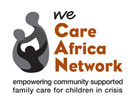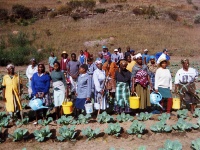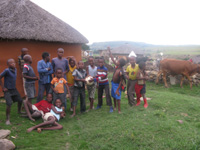
 |
| Home |
| Objectives |
| Initiatives |
| Donations |
| News from Africa |
| Training Courses |
| Links and Partners |
| Charity Job Opportunities |
| Contact Us |
Training Courses
|
Care Africa Network (CAN), is a small UK registered charity which works to improve the lives, health and education of orphans and vulnerable children and their families in Africa. In partnership with governments, local organisations and partners CAN empowers community-supported family care by disseminating effective methods for this purpose through publications, consultancy and training. It also provided other needs-led training. It is primarily a knowledge transfer agency but has on occasions also funded small income-generating projects that enable communities to be self-sufficient in the care of children in need for the future. CAN offers consultations to organisation concerning the development of community supported family care of OVC. CAN now also provides training courses which disseminate effective ideas and methods collected from 4 sub-Saharan countries, who have made available to CAN their best projects for developing good community supported family care. In response to specific requests CAN provides in addition a training course in the treatment of Post-Traumatic Stress Disorder in children using an effective patented method of Children's Accelerated Trauma Therapy (CATT). BACKGROUND The work of Care Africa Network has developed in partnership with members of governments, non-government organisations (NGOs), and community-based organisations, together with the families and children of the countries concerned. Four countries in sub-Saharan Africa have assisted in making available to CAN their most effective projects for the development of community-supported family care of children to promote future health and well-being. Through consultations with individual organisations, effective methods developed within these projects have been disseminated elsewhere by CAN to benefit other OVC, and in some cases CAN has also provided the necessary small initial funding that has enabled other communities to develop such projects. For example a method of drought-resistant permaculture that has proved successful in Lesotho in enabling families to continue to take into their household and care for their relative's orphans even in periods of drought, has been successfully transferred to Swaziland. There is now a plan to train thousands of community volunteers to teach this method to families in need. This will enable these families to support the OVC of relatives and thus prevent traumatised children who have lost their parents through diseases such as AIDS, growing up alone and being forced to resort to street living by crime or prostitution. Methods disseminated range from those empowering economically to enable families to continue to care for their children and their relatives OVCs, to helping to address in other ways all needs of children, - physical , psychosocial, educational and ethical including their need for protection from abuse and empowerment for the future. CAN also learns from the expertise and experience of local people through these consultations and in doing so adds to its knowledge of effective ideas and methods that can benefit children in need elsewhere. Feedback from those in the countries concerned about the work of CAN has been very positive. In addition to consultations to individual organisations CAN now provide two training courses. The nature and impact of these in Lesotho and Swaziland in 2015 are described below. TRAINING COURSE 1 Effective methods of facilitating good community supported care for OVC Course background In addition to physical needs, children have emotional, psycho-social, ethical and educational needs. These are interdependent. Since research of the |World Health Organisation in the 1950s, it now accepted that meeting the early attachment needs of children is critical to their development and mental functioning. A child whose attachment needs have not been adequately met will not only not develop healthily mentally but will also be unable to make use of educational opportunities available to them to learn and may also fail to thrive and grow normally physically. They are unlikely to be able to develop into healthy coping adults and mental hospitals and prisons have many inmates whose early attachment needs were unmet. Continuity of attachments as well as the quality of the attachments are important. To meet a child's psycho-social needs, and particularly the attachment need, it is most important for the child to grow up in a loving family who can satisfy the need for attachment. African culture has developed naturally and successfully to provide for attachment needs, and also the support needed to provide resilience to hardships. Traditionally African children belong to an extended family and are the responsibility of the whole community overseen by the village chief. A child's attachment needs are generally well met by child centred care with close quality relationships with particular family members, and other supportive relationships within the wider family. Shared care provides continuity when the mother cannot always be present. Furthermore reciprocity of obligations between a child and members of a community provide economic incentives for excellence in child rearing. Considering the difficulties it faces, this system has been highly successful for centuries in generally meeting the needs of all children, including OVC, within the family and community and should be valued and developed to meet new challenges. However, pressures of increased geographical mobility, poverty, westernization, and institutionalisation of children have eroded these systems. The unprecedented pressures of the magnitude of the AIDS orphan crisis with the loss of so many parents to AIDS, threatens the total destruction of this system. The consequences would be disastrous both in human and economic terms with thousands of destitute children and vulnerable adults and progress towards all development goals reversed. It is important to prevent this destruction by the dissemination of innovations and methods which have been used successfully to resurrect and empower good community supported family care in some areas, so these ideas and methods become available to benefit OVC elsewhere. This would enable the excellent cost effective and culturally appropriate African community care systems to develop to meet new challenges and be available for the benefit of future generations. The aim of Care Africa Network is to help to achieve this goal Course Content This course seeks to disseminate a range of effective ideas and methods that have been collected from four countries for the purpose of promoting good community supported family care of OVC. This includes methods of economic empowerment to enable extended families to continue to care for OVC as well as methods which help communities and families to meet the whole range of children's needs, - physical, emotional, psychosocial, educational and ethical including their needs for protection from abuse and empowerment for the future. The course encourages participants to consider which of these methods might be most appropriate to the particular situations and problems they encounter in meeting needs of OVC and to make plans how they could develop and implement appropriate solutions to these challenges so that the needs of OVC are met. The specific aims of the CAN methods course are to enable participants to: 1. Identify the particular needs of the OVC concerned and assess the difficulties in meeting these needs, 2. Consider the range of methods which have been successfully used elsewhere in similar challenging circumstances, 3. Select from these methods those that would be most relevant to their particular circumstances, and hence most helpful in enabling good community supported family care of the particular children in need, 4. Make plans for the tailoring of these ideas for the benefit of the children concerned and for their subsequent implementation. The evaluation of the CAN methods training course constitutes an integral part of the evolution of the course to ensure it remains fit for purpose. The delivery of this training in Lesotho and Swaziland in 2015 was accompanied by the provision of evaluation forms and the feedback forms collected from the organisations and individuals participating. This will be subsequently joined with any information received concerning the success, or otherwise, in implementing the plans made. Evaluation results of the CAN methods course held in Lesotho in 2015. All course participants reported that the course had been helpful in enabling them to support the needs of orphans and vulnerable children with whom they came in contact. They indicated that the course was pitched at an appropriate level. The average overall rating the participants gave the course as a whole was 86.7%, which is between good and excellent. A score of 100 equates to excellent, 80 to good, 60 to all right, 40 to not good, and 20 to bad. The following bar charts indicate how each participant scored the parameters of: course content, course presentation, exercises, and handouts.
Participants, who were drawn from all districts of Lesotho, made some very constructive proposals and proposed plans for how they could employ the ideas and methods from the course to improve the community- supported family care of OVC in the areas in which they worked. Qualitative feedback forms concerning the work of Care Africa Network in Lesotho was also very positive. (See report on training). Evaluation results of the CAN methods course held in Swaziland in 2015 All participants reported that the course had been helpful in providing them with ideas that would enable them to meet the needs of OVC better. They also suggested that the course was pitched at the right level. The average overall rating the participants voted for the course as a whole was 86.8% , which is between good and excellent. A score of 100 equates to excellent, 80 to good, 60 to all right, 40 to not good and 20 to bad. The following bar charts indicate how each participant scored their perceptions of the various features of the course in terms of: course content, course presentation, exercises, and hand-outs. All aspects were evaluated as being between good and excellent.
Participants, who were drawn from across Swaziland, proposed a number of excellent ideas as to how they would wish to improve the lives of OVC by developing community supported family care. These built on the ideas and methods presented in the course. Qualitative feedback forms concerning the work of CAN in Swaziland were also extremely positive. CAN Extension Workers Everyone working for CAN donates their time free of charge. The overall aim of CAN is to improve the lives of OVC and their families by disseminating ideas and methods which effectively enable good community supported family care of OVC, ensuring that all their needs, physical, psychosocial, emotional, ethical and educational including their need for protection are provided for. Course participants are invited to become CAN Extension Workers disseminating further any beneficial ideas and methods learnt from the course to benefit more OVC. TRAINING COURSE 2 The treatment of Post-Traumatic Stress Disorder (PTSD) in children using Children's Accelerated Trauma Therapy (CATT) One of the CAN aims is to provide, if possible, specific needs-led training when requested. Because of the numbers of children traumatised by conflict or the death of their parents, often due to AIDS, and subsequently experiencing severe mental health difficulties, partner organisations and others have specifically requested that CAN provide training in the treatment of Post- Traumatic Stress Disorder (PTSD) in children. In order to do this well, the founder of CAN, Francesca Simms, who was already employed as a therapist in the NHS Child and Adolescent Mental Health Service (CAMHS) in UK, offered to undertake additional training in the treatment of PTSD using Children's Accelerated Trauma Therapy (CATT). She also underwent training to teach this method, and in return for helping to teach it in South Africa for the charity concerned, now has a licence to teach this very effective, patented method. Finding the method exceptionally successful in treating her own patients, both in curing PTSD and in resolving secondary severe mental health difficulties (see table of treatment results), she offered to train other CAMHS clinicians in the UK in the method. For a year she was employed to train a selected number of clinicians from all the CAMHS teams in Hampshire, UK in the treatment of PTSD using CATT, and then provided ongoing supervision to those trained across Hampshire. All of the evaluation reports from participants on these courses voted that the courses provided were good or excellent. The CATT method CATT is a child friendly adaption of the Cognitive Behavioural Therapy (CBT) protocol utilising a play/art method, and is based on scientific evidence on the effects of trauma in the brain. It works by transferring the memory of the traumatic event from the amygdule to the hippocampus so that it can be subjected to logical thought. Francesca has found it has been successful in 100% of the cases where she has employed it (see table of treatment results). Children report that their PTSD symptoms disappear immediately after the core treatment session and once the symptoms have gone, secondary severe mental health difficulties are usually quickly resolved. CATT has been highly successful when used in Rwanda for treating PTSD following the genocide there, and has been adopted as the official method of treatment in that country. It has been used successfully in the UK, and random control trials are now underway in Uganda. (See the evidence basis for CATT). This dramatically effective method needs to be made available for the benefit of traumatised OVC elsewhere in Africa. Aims and objective of CAN training course in treatment of PTSD in children using CATT The aim of the course is to train members of partner organisations and others working with traumatised OVC in the diagnosis and effective treatment of PTSD using CATT. The course is designed for participants to become practitioners since the restrictions of the patent prevent them being able to be train others in the procedure. The specific objectives of the CATT course are to enable participants competently to: 1. Diagnose whether a child has PTSD 2. Select a suitable treatment method 3. Display competence in how to adapt the method to suit a particular child, for example through the reasoning for why a particular stage may be omitted for that child. 4. Demonstrate the successful implementation of all the stages of the CATT method by: i. Creating a comfortable setting for the child ii. Ensuring a sense of safety iii. Systemic working with those in sustainable relationships with the child iv. Psycho education v. Identifying the difficulty in a child-centred way and upholding children's rights vi. Conducting a needs assessment vii. Setting and agreeing goals viii. Applying phase 1 of the trauma treatment ix. Applying phase 2 of the trauma treatment x. Rehearsal (guided imagery) and progressive desensitisation xi. Trial and evidence xii. Returning to the needs assessment, reviewing the needs of the child, and reassessing what is still required. 5. Treating multiple traumas 6. Considering when it is appropriate to use CATT 7. Prevention of compassion fatigue and secondary trauma (care of oneself as the therapist). Post event evaluation of the CAN training course in the treatment of PTSD using CATT constitutes an important feature to ensure an appropriate evolution of the course.. Accordingly, course evaluation forms are provided to participants as well as feedback forms concerning the work of CAN. Participants are also requested to send follow up information concerning success of treatment as measured by CRIES 8, (an effective measure of PTSD developed by The Children in War Foundation) and PTSD checklists before and after treatment of each child. Evaluation of CAN training course in CATT for treatment of PTSD in Lesotho in 2015 All of the participants reported that the course had been helpful in enabling them to treat children suffering from PTSD, and that the course was pitched at the right level. The average overall rating the participants gave the course was 82.8% , which was between good and excellent. A score of 100 equates to excellent, 80 to good, 60 to all right, 40 to not good, and 20 to bad. The following bar charts indicate how each participant scored the parameters of course content, course presentation, exercises, and handouts.
Feedback forms were very positive, and a follow up course was requested. Evaluation of CAN training course in CATT for the treatment of PTSD in Swaziland 2015 All of participants reported that the course had been helpful in enabling them to treat children suffering from PTSD, and that the course was pitched at the right level. The average overall rating the participants gave the course was 86.7% , which was between good and excellent. A score of 100 equates to excellent, 80 to good, 60 to all right, 40 to not good and 20 to bad. The following bar charts indicate how each participant scored the course in terms of the parameters of: course content, course presentation, exercises, and handouts. All parameters were assessed as being between good and excellent.
Feedback forms were also very positive, and a follow up course was requested.
|
|






